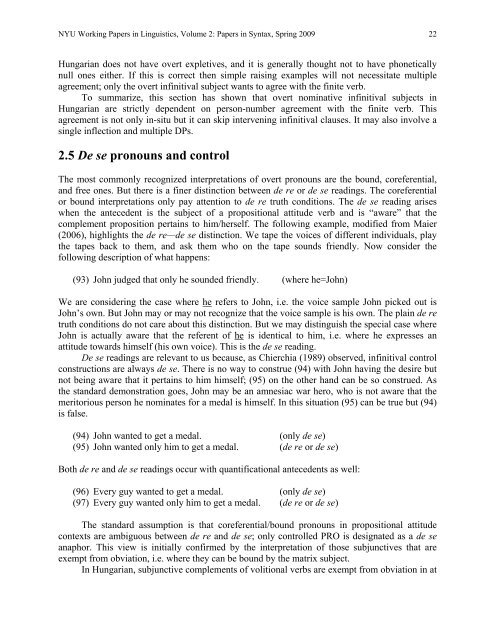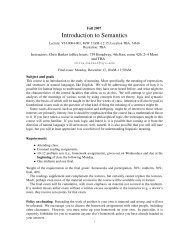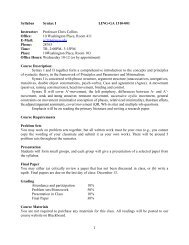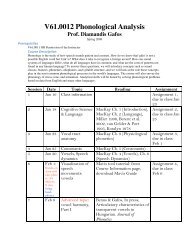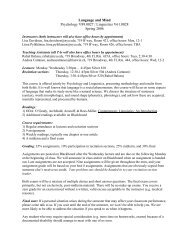Overt Nominative Subjects in Infinitival Complements Cross - NYU ...
Overt Nominative Subjects in Infinitival Complements Cross - NYU ...
Overt Nominative Subjects in Infinitival Complements Cross - NYU ...
You also want an ePaper? Increase the reach of your titles
YUMPU automatically turns print PDFs into web optimized ePapers that Google loves.
<strong>NYU</strong> Work<strong>in</strong>g Papers <strong>in</strong> L<strong>in</strong>guistics, Volume 2: Papers <strong>in</strong> Syntax, Spr<strong>in</strong>g 2009 22Hungarian does not have overt expletives, and it is generally thought not to have phoneticallynull ones either. If this is correct then simple rais<strong>in</strong>g examples will not necessitate multipleagreement; only the overt <strong>in</strong>f<strong>in</strong>itival subject wants to agree with the f<strong>in</strong>ite verb.To summarize, this section has shown that overt nom<strong>in</strong>ative <strong>in</strong>f<strong>in</strong>itival subjects <strong>in</strong>Hungarian are strictly dependent on person-number agreement with the f<strong>in</strong>ite verb. Thisagreement is not only <strong>in</strong>-situ but it can skip <strong>in</strong>terven<strong>in</strong>g <strong>in</strong>f<strong>in</strong>itival clauses. It may also <strong>in</strong>volve as<strong>in</strong>gle <strong>in</strong>flection and multiple DPs.2.5 De se pronouns and controlThe most commonly recognized <strong>in</strong>terpretations of overt pronouns are the bound, coreferential,and free ones. But there is a f<strong>in</strong>er dist<strong>in</strong>ction between de re or de se read<strong>in</strong>gs. The coreferentialor bound <strong>in</strong>terpretations only pay attention to de re truth conditions. The de se read<strong>in</strong>g ariseswhen the antecedent is the subject of a propositional attitude verb and is “aware” that thecomplement proposition perta<strong>in</strong>s to him/herself. The follow<strong>in</strong>g example, modified from Maier(2006), highlights the de re—de se dist<strong>in</strong>ction. We tape the voices of different <strong>in</strong>dividuals, playthe tapes back to them, and ask them who on the tape sounds friendly. Now consider thefollow<strong>in</strong>g description of what happens:(93) John judged that only he sounded friendly. (where he=John)We are consider<strong>in</strong>g the case where he refers to John, i.e. the voice sample John picked out isJohn’s own. But John may or may not recognize that the voice sample is his own. The pla<strong>in</strong> de retruth conditions do not care about this dist<strong>in</strong>ction. But we may dist<strong>in</strong>guish the special case whereJohn is actually aware that the referent of he is identical to him, i.e. where he expresses anattitude towards himself (his own voice). This is the de se read<strong>in</strong>g.De se read<strong>in</strong>gs are relevant to us because, as Chierchia (1989) observed, <strong>in</strong>f<strong>in</strong>itival controlconstructions are always de se. There is no way to construe (94) with John hav<strong>in</strong>g the desire butnot be<strong>in</strong>g aware that it perta<strong>in</strong>s to him himself; (95) on the other hand can be so construed. Asthe standard demonstration goes, John may be an amnesiac war hero, who is not aware that themeritorious person he nom<strong>in</strong>ates for a medal is himself. In this situation (95) can be true but (94)is false.(94) John wanted to get a medal. (only de se)(95) John wanted only him to get a medal. (de re or de se)Both de re and de se read<strong>in</strong>gs occur with quantificational antecedents as well:(96) Every guy wanted to get a medal. (only de se)(97) Every guy wanted only him to get a medal. (de re or de se)The standard assumption is that coreferential/bound pronouns <strong>in</strong> propositional attitudecontexts are ambiguous between de re and de se; only controlled PRO is designated as a de seanaphor. This view is <strong>in</strong>itially confirmed by the <strong>in</strong>terpretation of those subjunctives that areexempt from obviation, i.e. where they can be bound by the matrix subject.In Hungarian, subjunctive complements of volitional verbs are exempt from obviation <strong>in</strong> at


